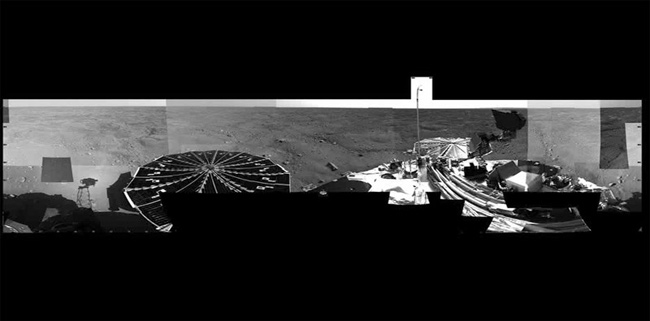Mars Probe Loses Some Data in Memory Glitch

NASA?s Phoenix Mars Lander has lost some science observations in an odd glitch after generating too much housekeeping data, mission managers said Wednesday.
Phoenix engineers are investigating why the anomaly, which affected only unessential science data,occurred. It shouldn't be a problem today, they added, because they've plannedactivities for Phoenixthat do not require the probe to store science data overnight.
"The spacecraft is healthy and fully commandable, butwe are proceeding cautiously until we understand the root cause of thisevent," said Phoenix project manager Barry Goldstein of NASA's JetPropulsion Laboratory.
The spacecraft normally accumulates a small amount of dataeveryday having to do with maintaining its computer and normal functioning.This data is classified as high priority and gets stored in the spacecraft's flashmemory.
For some reason, Phoenix gathered so much housekeeping informationon Tuesday that it crowded out science data from being stored in flash memory.The excess science was lost Wednesdayafter the spacecraft powered down for the Martian night after completing its22nd Martian day, or sol, since landingMay 25.
The lost data was not high-priority, NASA said, and theimages can mostly be retaken.
To save Phoenix's memory from being overburdened, missionmanagers told the spacecraft not to pursue any new science investigations onWednesday and to lower the priority for the kind of housekeeping data that overwhelmedit on Tuesday.
Get the Space.com Newsletter
Breaking space news, the latest updates on rocket launches, skywatching events and more!
"We can continue doing science that does not rely on non-volatilememory," Goldstein said in a status update.
This has not been a problem until now because Phoenixusually downlinks most of the science data it collects back to Earth the sameday it is gathered. Occasionally, the spacecraft collects more data than canfit in the afternoon package sent down, and this data is stored overnight, tobe sent the following Martian morning.
While mission managers are investigating the reason for theflood of housekeeping data, they will tell Phoenix to refrain from storing anyscience data overnight. They have also added extra communication-relayopportunities during the Martian day on Thursday so Phoenix can send back asmuch science data as it can gather. The spacecraft plans to spend today diggingtrenches, taking pictures and monitoring the weather.
The $420-million mission is set to study the Martian arctic for three months to determine if the region could have once been habitable to life.
- Video: Sounds From Phoenix Mars Lander's Descent
- Video: NASA's Phoenix: Rising to the Red Planet
- New Images: Phoenix on Mars!
Join our Space Forums to keep talking space on the latest missions, night sky and more! And if you have a news tip, correction or comment, let us know at: community@space.com.

Clara Moskowitz is a science and space writer who joined the Space.com team in 2008 and served as Assistant Managing Editor from 2011 to 2013. Clara has a bachelor's degree in astronomy and physics from Wesleyan University, and a graduate certificate in science writing from the University of California, Santa Cruz. She covers everything from astronomy to human spaceflight and once aced a NASTAR suborbital spaceflight training program for space missions. Clara is currently Associate Editor of Scientific American. To see her latest project is, follow Clara on Twitter.
